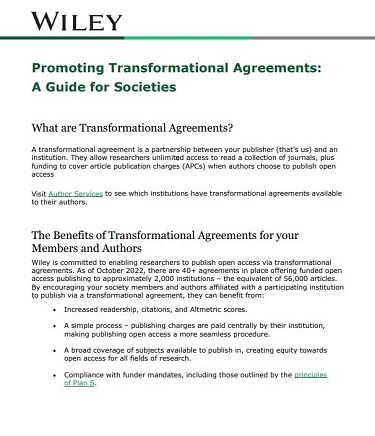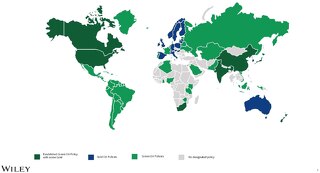8-reasons--why-sound-science-is-crucial-in-an-open-access-world
June 14, 2022
Open Science is all about increasing the integrity, openness, and reproducibility of research. So, what role does sound science play in supporting these aims? Our recent Wiley Editor Seminar on “The value of open research publishing” focused on the importance of sound science in an open access world and how it is crucial to the progression of knowledge.
How do we define sound science?
By definition, sound science must be i) scientifically valid – adhering to accepted community standards of research; ii) technically accurate in its methods and results; iii) representative of a specific advance, or replication, or null/negative result, which is worthy of publication; iv) as reproducible as possible – sharing underlying data, code, and supporting materials wherever able; and v) ethically sound – adhering to best practice with respect to animal and human studies, consent to publish, and clear declaration of potential conflicts of interests, both real and perceived.
As such, sound science journals publish research on common but important issues, with a focus on quality rather than perceived novelty or (citation) impact. This means all published research undergoes rigorous peer review and journals are built on a very robust editorial process. Editors maintain their editorial independence, to ensure that published research is accurate and of high quality. With sound science, the collective mission is to ensure there’s a home for every paper and to deliver rapid decisions for authors. Examples of research outputs include:
- Confirmatory research
- Replication studies
- Negative results
- Research building on existing work
Why is it important?
- Accelerates discovery and dissemination of peer-reviewed research – the greater the volume of published research, the more information there is available to piece together the bigger picture. For example, case studies can help us gain a broader, more holistic understanding of issues like emerging diseases.
- Builds the foundations for further study – it may not be novel, but many of the research outputs form the building blocks for further research in their field.
- Saves time – for example, publishing negative results or a failed experiment could save other researchers from duplicating those efforts.
- Solution to the reproducibility crisis – sound science can help measure what percentage of research studies fail to replicate previous results. By publishing the results of unsuccessful replications, we could uncover issues such as study design or other conditions that are contributing to the reproducibility crisis.
- Educational value – not all research has citation value, but it could have educational value that can be used in teaching or public policy or for re-use.
- Improves author service – providing excellent author service is key to being successful in an open access world. We know that authors are under a lot of time pressure - due to the rapid turnaround times of sound science journals, we can save authors time and effort. Even more so with Refer and Transfer, which enables authors of a rejected paper to transfer their article to another journal that is more suitable and helps protect reviewer time for manuscripts transferred after peer review. All publishable, good quality research is important for progressing knowledge. As journals that focus on quality more than perceived novelty, sound science journals are key to the success of journal transfer networks and help mitigate the risk of valuable, peer reviewed information not being published.
- Supports inclusivity and diversity in research - sound science enables us to serve the research community as a whole. Since they’re not focused on publishing novel or ground-breaking results and build on open science principles, sound science journals offer authors from internationally diverse communities, and at every career stage, a venue to publish their research. Being open access journals, their content is universally and freely accessible, at no cost to the readers, enabling equal access to scientific knowledge. Sound science journals also cover a more diverse range of outputs, which contributes to solving global challenges. This includes population studies, regional case studies and results coming from less well-funded hospitals and labs across the globe.
- A fairer way to celebrate researchers and research impact - Increasingly, funders and organizations such as DORA, (of which Wiley has become a recent signatory), UKRI, UNESCO and others are focusing on responsible approaches to research assessment. This includes not only how we measure article performance, but also acknowledging the individual contributions of authors. CReDiT plays a role in this, and sound science, expanding the range of publishable research output, allows for increased recognition and reward for all authors.
Open access brings opportunity to make research more open, accessible and fair. By enriching the range of research we publish and improving our service to authors, sound science plays an important role in this future.











